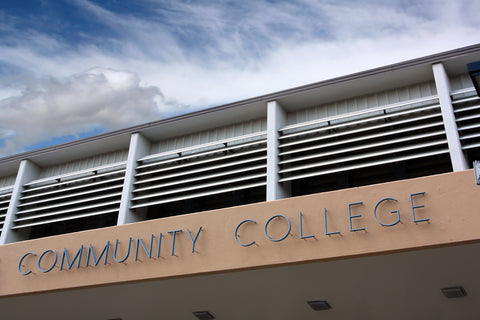Most parents hope their son or daughter performs well enough in school to be accepted into a top college or university. Teachers, guidance counselors, and school officials do their best during school hours to help students see the value in a post-secondary education and the ever-growing importance of a college degree.
With enough hard work and determination, dedicated students might be lucky enough to receive the acceptance letter from their dream school. But while attending a four-year college or university is an admirable goal, a lot can be said about attending community college first.
Many students, including parents and school officials, may give the perception that community college is a second-rate choice in terms of a post-secondary education. They view it as the lazy student’s easy way to a college degree. However, for a determined student who simply could not make the grades they needed or a student who simply could not afford the crushing costs of a four-year degree, community college might be their only option.
Community college does not mean settling for an easy path to a degree. In fact, it can be an incredibly smart financial decision for those hoping for a bachelor’s degree or higher. It can also be a great steppingstone to securing a better job than those only a high school diploma can provide.
Making the Case for Community Colleges
1. Considerably Cheaper Tuition
Ask anyone who has attended college in the last ten years and you’re almost guaranteed to hear complaints about the cost of attending a four-year college or university.
For the 2017-2018 school year, the average cost of attending a public college for one year was $25,259 for in-state students and $40,940 for out of state students. Private colleges cost $50,900 on average.
In comparison, community college students in the 2019-2020 school year are expected to pay between $4,811 (in-state) and $8,584 (out of state). Even private community colleges cost significantly less than their 4 year counterparts at only $15,468 on average.
With the cost of crippling student loan debt skyrocketing in the last fifteen years to $1.7 billion dollars nationally, saving $20,000 to $40,000 in tuition by choosing to take preliminary classes at a community college makes financial sense.
Students may also use federal assistance while they’re in school as long as they’re taking a minimum of six credit hours or they may risk losing their award.
2. Transferable credits
Many state colleges and universities across the country have agreements with local community colleges that allow the hours from some classes to be transferred. This is useful for students choosing to start a community college, then continue their degree at four-year college or university.
It's important students inquire at their community college or future four-year school what classes they will honor when they decide to transfer. This will prevent students from taking classes they ultimately can’t put towards their final degree.
3. Better Personalized Instruction Opportunities
At a large college or university, it can be difficult to speak with an instructor or receive tutoring if you’re having trouble with the material. At a community college, smaller class sizes allow instructors to help students who require more assistance, which offers the added benefit of building closer educational relationships with their students.
Beyond instructional opportunities, many colleges offer additional support services for students such as remedial math, reading, and writing courses, counseling services, academic advising, peer tutoring, study skills help, and even assistance for students who speak English as a second language.
4. Quicker Access to STEM-Based Degrees or Certifications
The job market is quickly transitioning to jobs dependent on an education in STEM, or science, technology, engineering, and mathematics. While many advanced degrees require students to attend college for the full for years or longer, technology and advanced manufacturing companies can’t afford to wait that long anymore. As the demand increases for skilled and trained workers, businesses are willing to pay more for anyone ready to start working now.
Community colleges, located in cities where tech and advanced manufacturing businesses are booming, often have agreements with these companies to funnel students into their businesses upon completion of their associate’s degree. Some jobs may not require a full degree and instead simply require certification in some type of advanced training. Community colleges can provide access to these certifications and get students who aren’t interested in an advanced degree working in a high-paying career quickly.
5. Stay Home and Save Money
As a sign of the times, many young people are moving out of their parent’s home at older ages because of the cost of living and to save money while studying. Because starting at a community college is considerably cheaper, students intending to move on to a four-year college or university can save up money while living at home and put it towards their own living expenses when they’re ready to leave or help their parents with living expenses with the money they’ve saved.
Some students on a three-year graduation high school plan may be too young to attend a four-year college. Community college allows these students to keep on with their educational goals while not having to move into a dormitory for their first year of school.
Living at home also allows young adults working full time to support a family to take online courses offered by community colleges, letting them study at a pace that works for their busy schedules.
Whether you’re hoping to save a bit of money, stay closer to home, or trying to earn a degree or certification to advance your career, community colleges should never be overlooked as a great opportunity to do all three. Cities across the country have strong community colleges and many professionals started at a local community college before reaching success. The coursework may not be as rigorous as a four-year school, but dedicated students who apply themselves can obtain a great education regardless of the school.
June 2020 Update:
Changes to interest rates thanks to the Federal Reserve might help you if you're a college student with student loans. Check out this article from Bankrate for a detailed explanation of all the new changes.




Comments (0)
There are no comments for this article. Be the first one to leave a message!